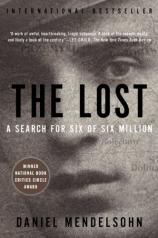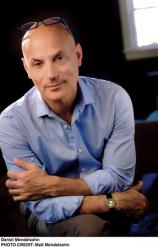The Lost: A Search for Six of Six Million
Review
The Lost: A Search for Six of Six Million
In 1998, a group of middle-school students in Whitwell, Tennessee, a small town whose residents are almost all white and all Christian, embarked on a project designed to help them grasp the human scale of the Holocaust. To do that, they collected paper clips with the goal of accumulating six million --- one for each of the Jews slaughtered by the Nazis. Their project is recounted in the moving 2004 documentary film Paper Clips, a powerful story about tolerance and overcoming prejudice.
In his gripping memoir, THE LOST: A Search for Six of Six Million, Daniel Mendelsohn, a classics scholar and literary critic, approaches the same historical events from a dramatically different perspective, recounting his quest --- one that consumed five years and took him around the globe --- to discover more about the lives, and deaths at the hands of the Nazis, of his great uncle Shmiel Jäger, his wife Ester and their four daughters: Lorka, Frydka, Ruchele and Bronia. As he describes his task, "Often it is the small things, rather than the big picture, that the mind can comfortably grasp: that, for instance, it is naturally more appealing to readers to absorb the meaning of a vast historical event through the story of a single family."
From an early age, Mendelsohn had been captivated by the stories shared by his maternal grandfather, Abraham Jaeger, who had left his home in the village of Bolechow, Poland (now Bolekhiv, Ukraine), in the Galicia region, for the United States at age 18. Abraham's older brother, Shmiel, had made the same pilgrimage, but for reasons that are never fully understood --- perhaps sibling conflict or the desire to attain prominence in his small town --- he returned to Bolechow, where he became a prosperous butcher and well-known member of the Jewish community. As a youngster, Mendelsohn heard his mother and her immigrant relatives speak in hushed tones of family members who had been "killed by the Nazis," and this cryptic reference spurred him on a quest to tell their story.
Accompanied by his brother Matt, an accomplished portrait photographer whose black and white photographs are sprinkled throughout the book, Mendelsohn travels from Bolechow to Israel, Australia, Sweden and Denmark, among other countries, and then back to Bolechow where he brings the memoir to a moving climax. He persistently and skillfully mines the sometimes tissue-thin memories of Holocaust survivors and others, many of them in their 80s and 90s, for facts that will help him reconstruct what life was like for Shmiel and his family and how they met their respective fates. Against formidable odds, he's able to illumine aspects of their personalities and to relate, in at least one case with disturbing specificity as he describes the first "Aktion" or mass killing of Bolechow Jews in October 1941, how they died. In the end, fewer than 50 of the town's 6,000 Jews escaped annihilation. THE LOST is peopled with vivid characters and tales of heroism and cowardice; in short, its pages are filled with humanity in all its complexity.
Into his tale, Mendelsohn weaves scholarly meditations on some of the stories of the Book of Genesis, from the Creation narrative through the story of Abraham. Impatient readers may find themselves skimming these passages to get back to the main narrative thread, but the juxtaposition of these familiar stories with the events of the Holocaust invests them with new meaning.
One of the most poignant aspects of Mendelsohn's book is the page at its conclusion entitled "In Memoriam." There, he lists the names of seven of his interviewees who died in the course of the project. While the goal of fully recreating who his relatives were, how they lived and how they died was, in the end, elusive, how much more daunting will that task be for others when the last of the Holocaust survivors are gone?
Probably because the fate that befell the Jews of Europe between 1939 and 1945 remains so incomprehensible in its horrific scope, few other historical events have inspired such a wealth of compelling literature as the Holocaust. Daniel Mendelsohn's THE LOST justifiably deserves a place among the most valuable contributions to that body of work.
Reviewed by Harvey Freedenberg(mwn52@aol.com) on January 6, 2011
The Lost: A Search for Six of Six Million
- Publication Date: November 12, 2013
- Genres: Nonfiction
- Paperback: 672 pages
- Publisher: Harper Perennial
- ISBN-10: 0062277774
- ISBN-13: 9780062277770





